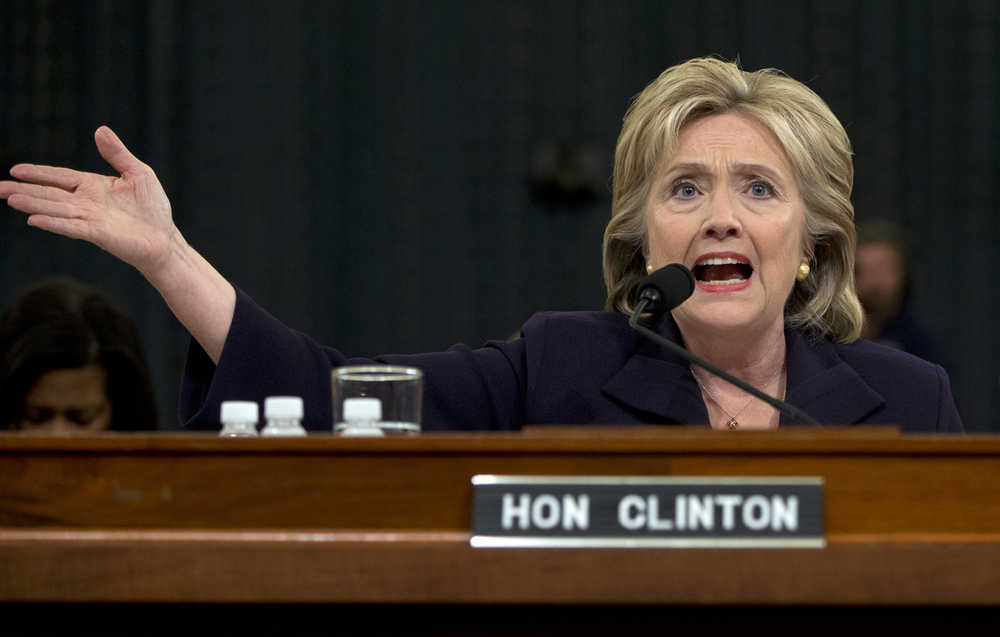WASHINGTON — Hillary Rodham Clinton strove to close the book on the worst episode of her tenure as secretary of state Thursday, battling Republican questions in a marathon hearing that grew contentious but revealed little new about the 2012 attacks in Benghazi, Libya. She firmly defended her record while seeking to avoid any mishap that might damage her presidential campaign.
Pressed about events before and after the deaths of four Americans, Clinton had confrontational exchanges with several GOP lawmakers but also fielded supportive queries from Democrats. The most combative moments focused on accusations about the Obama administration’s shifting public accounts of the attacks.
However, there were few questions for the Democratic presidential front-runner about the specific events of Sept. 11, 2012, which Clinton said she continues to lose sleep over. “I have been wracking my brain about what more could have been done or should have been done,” she told the House Benghazi Committee.
The hearing, which began at 10 a.m., continued deep into the evening.
The panel’s chairman, Trey Gowdy, portrayed the investigation as focused on the facts after fellow Republicans recently described it as designed to hurt Clinton’s presidential bid. Democrats have pounced on those remarks and pointed out that the probe has now cost U.S. taxpayers more than $4.5 million and, after 17 months, lasted longer than the 1970s Watergate investigation.
Gowdy, a former federal prosecutor, said the Republicans’ efforts were not a prosecution.
Contradicting him, Rep. Adam Smith, a Democrat from Washington, told Clinton: “The purpose of this committee is to prosecute you.”
In one tense moment, Republican Rep. Jim Jordan of Ohio accused Clinton of deliberately misleading the public by linking the Benghazi violence at first to an Internet video insulting the Muslim Prophet Muhammad.
Clinton, stone-faced for much of the hearing, smiled in bemusement as Jordan cut her off from answering. Eventually given the chance to comment, she said only that “some” people had wanted to use the video to justify the attack that killed Ambassador Chris Stevens and three other Americans, and that she rejected that justification.
The argument went to the origins of the disagreement over Benghazi and how President Barack Obama and his top aides represented the attack in the final weeks of his re-election campaign. And it reflected some of the raw emotion the deadly violence continues to provoke, something Clinton will have to face over the next year of her White House bid even if the Republican-led special investigation loses steam.
For Clinton, the political theater offered opportunity and potential pitfalls. It gave her a high-profile platform to show her self-control and command of foreign policy. But it also left her vulnerable to claims that she helped politicize the Benghazi tragedy.
“There were probably a number of different motivations” for the attack, Clinton said, describing a time when competing strands of intelligence were being received and no clear picture had yet emerged. Speaking directly to Jordan, she said: “I’m sorry that it doesn’t fit your narrative. I can only tell you what the facts were.”
As the hearing neared its conclusion, the Republican questioning became increasingly aggressive. Rep. Martha Roby of Alabama, however, drew laughter from Clinton by asking if she was alone “the whole night” of the attacks after returning home.
Challenged that she didn’t care enough about the attack victims, Clinton choked up while recounting a conversation with a guard wounded in Benghazi. “Please do everything you can so that I can go back in the field,” Clinton recalled him asking her. “And I told him I would. He was determined to go back, to protect our diplomats, to protect you when you travel,” she added, directing the last words at the lawmakers.
There were no gaffes for Clinton. And she never raised her voice as she had at a Senate hearing on Benghazi in January 2013, when she shouted: “What difference, at this point, does it make?” Given that Republicans campaigned off that oft-repeated sound bite, the lack of an indelible image from Thursday’s hearing would suit Clinton’s campaign fine.
Thursday’s appearance came at a moment of political strength for Cher. A day earlier, a potential rival for the Democratic nomination, Vice President Joe Biden, announced he would not join the race. Clinton also is riding the momentum of a solid debate performance last week.
Gowdy said important questions remain unanswered: Why was the U.S. in Libya, why were security requests denied, why couldn’t the military respond quickly on the 11th anniversary of 9/11 and why did the administration change its explanations of the attacks in the weeks afterward?
Clinton focused on the bigger picture, starting with a plea for the U.S. to maintain a global leadership role despite the threat to its diplomats. She said that perfect security can never be achieved, drawing on the various attacks on U.S. diplomatic and military installations overseas during the presidencies of her husband, Bill Clinton, in the 1990s and Ronald Reagan a decade earlier.
“In Beirut we lost far more Americans, not once but twice within a year,” she said of the 1983 attacks in Lebanon that killed more than 250 Americans and dozens of others. “People rose above politics. A Democratic Congress worked with a Republican administration to say, ‘What do we need to learn?’”
Wearing a dark suit, Clinton held her chin in her hand while Gowdy interrogated her. At other times, the effort to restrain herself from a fight was more apparent. She also nodded occasionally, as when the committee’s top Democrat, Rep. Elijah Cummings of Maryland, described the probe as a partisan campaign replete with implausible conspiracy theories.
The Republican criticism has included contentions by some lawmakers that Clinton personally denied security requests and ordered the U.S. military to “stand down” during the attacks. None of these were substantiated in the independent Accountability Review Board investigation ordered by Clinton after the attacks or seven subsequent congressional investigations.
___
Follow Bradley Klapper: http://twitter.com/bklapperAP
Follow Matthew Daly: http://twitter.com/MatthewDalyWDC

